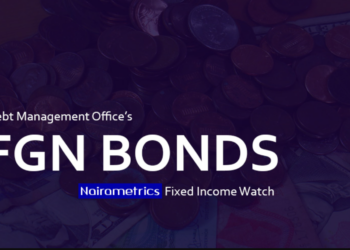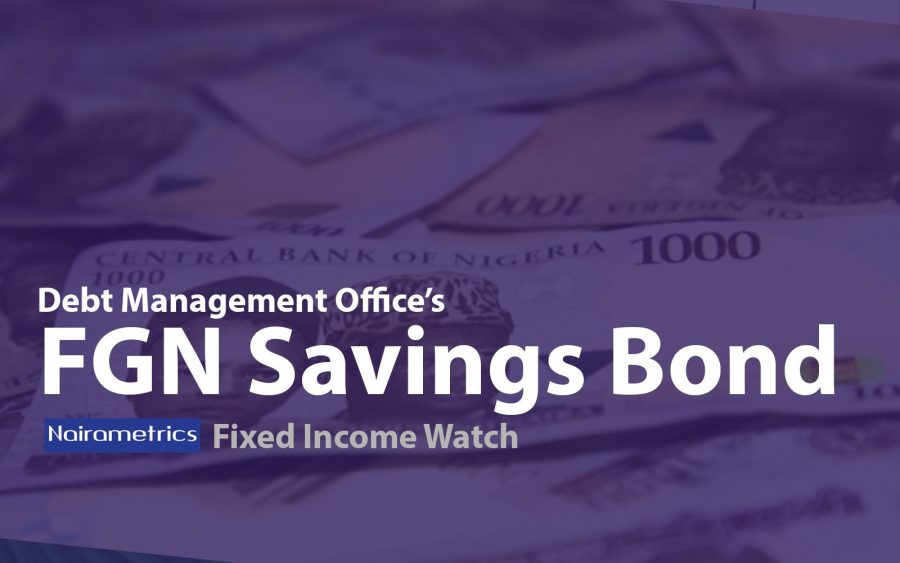The Debt Management Office of Nigeria launched a new retail investment program called the FGN Savings Bonds. In this article, Nairametrics will explain what the FGN Savings Bond means and how you can subscribe to it. We will also explain the difference between this product and other similar ones such as Treasury Bills. You can call this article the A-Z of the FGN Savings Bonds.
What is a Bond?
A bond is a confirmation from a borrower that it borrowed money (cash) from a lender at a given interest rate and repayable over a period. Bonds also include how payment of the principal and interest will be made. They also include the minimum amount that can be subscribed by a lender and in what multiples. Bonds are evidenced by an instrument typically issued by a company or country in exchange for cash.
What are FGN Bonds?
FGN Bond is a bond issued by the Nigerian government in exchange for cash at a given interest rates and a repayment period. It also states how payments of the principal and interest will be made. Nigeria has more than one FGN Bond, with each differentiated by their tenor (duration) and interest rates.
What is FGN Savings Bond?
An FGN Savings Bond is a bond issued by the Debt Management Office on behalf of the Nigerian Government. The bond is tailored and targeted at retail investors and includes a guaranteed interest payment and repayment of the principal. You can check this article for more on FGN Savings Bond.
Why is the government issuing a retail bond?
The government is issuing savings bonds targeted at ordinary Nigerians of all income groups, giving them the opportunity to earn an income through saving and investing. The bond is also expected to help promote the savings culture of Nigerians. Most Nigerians are thought not to save in banks because of very low-interest rates.
What are the benefits ?
- The bond earns you an interest that will be paid quarterly directly into your bank account.
- The bond is safe and is backed by the full faith and credit of the FG. Government Bonds hardly default, so you are nearly 100% sure that you will get your money back in full along with the interest.
- You need not be rich to invest as anyone with as little as N5,000 can invest in the bond.
- FGN Savings Bond is a good way to save towards your marriage, an occasion, school, project, retirement etc.
- You can also use the Bond as a collateral to get a loan from a bank.
What are the risk ?
FGN Bonds are often said to be risk free because the Federal Government hardly defaults on debt repayments especially if it is a Naira denominated debt. However, being a bond there are a few risks, should you decide to sell before maturity. Just like a stock, you can invest N1 million in a bond and get only N900k in principal. We’ll explain this later. You also face the risk of losing the value of your investment to inflation. If the interest rate on the FGN Savings Bond is lower than inflation rate, then your returns are lower than in real terms. In a high inflationary environment like Nigeria, investing in bonds can lead to a loss of value if the rates are lower than inflation.
How much can I invest?
Retail investors looking to invest in the FGN Savings Bond only need a minimum of N5,000 to invest. Subsequent investment over N5,000 will be in multiples of N1,000. Meaning that you cannot invest N5,500 or N12,700. It’s either N6,000 or N13,000 or N30,000. The maximum amount a single retail investor can invest in the FGN Bond is N50 million.
Where can I buy it from?
You can buy it from any of the approved registered stockbrokers. Just ask your stockbroker if they are authorised to sell. It’s that simple.
What is the tenor of the loans and what is the interest rate?
The bonds have a tenor of 2 and 3 years respectively. Meaning that you can either invest in an FGN Savings Bond with a duration of 2 years or one with a duration of 3 years. The interest rates are determined by the Debt Management Office. They decide what rates they are willing to pay.
How will the interest and principal be paid?
The interest will be paid quarterly into your bank accounts while the principal will be paid at maturity (the end of the tenor, 2 or 3 years) depending on what duration you subscribed to.
When did the government, start selling FGN Savings Bonds?
The Federal Government through the Debt Management Office will start selling FGN Bonds on the 13th of March 2017.
Will it be issued monthly?
Yes, the FGN Savings Bond will be issued monthly
What if I decide to sell before maturity?
You need not hold on to the bond until maturity. If you need cash anytime during the duration of the bond, you can sell your bond in exchange for cash. However, the portion of the interest that you are not entitled to earn because you have sold will not accrue to you any longer. For example, if you buy March 13 and sell August 13 2017 because you cannot wait till March 2019 (after two years) to get your principal, you will only be entitled to the interest earned between March 13 and August 13 2017. However, note that should you wish to sell before maturity, you might pay a transaction fee. Also, because it is a bond, the price you get might be more or higher depending on the market value of the bond.
What is a market value?
A bond has certain characteristics similar to a stock. Being an instrument, bond prices can often be higher or lower than their face value. A face value of a Nigerian Bond is typically N1,000. Let’s assume you bought FGN Savings bond at N1 million and at an interest rate of 13% per annum. It means that for every N1,000 of your investment, you will earn N130 (also known as the coupon rate). So, if you decide to hold your N1 million to maturity, you will earn N130k annually.
In the secondary market, bond prices behave like stock and react to the forces of demand and supply. Supposing lending rates in the country suddenly rise to 16%. It means that the bond you bought that earns you 13% is no longer attractive as the FG will only continue to pay the N130 for every N1,000 in Face value.
To therefore earn a return of 16% at the coupon of N130, the bond will need to sell for a Face Value of N814.11. So, should you wish to sell your bond when the price is going for N814.11, either because you are in need of cash or just as part of your trading activities, you will only get N814.1k (still subject to charges) and lose N185.8. This explains the risks we talked about earlier.
Can I buy even more within a tenor?
Yes, you can subscribe for more provided it is in multiples of N1,000 and not exceeding a total cumulative amount of N50 million.
What is the difference between FGN Savings Bonds and Treasury Bills?
- Unlike Treasury Bills, FGN Savings Bonds has a duration of between 2-3 years. Treasury Bills are not more than 1 year with shorter tenors of 91 days and 182 days.
- Treasury Bills rates are determined by the forces of demand and supply. The DMO says, the FGN Saving Bonds rates will be determined by them
- Treasury Bills interest rates are paid upfront. For example, if you invest in Treasury Bills today, they will pay you all your interest today. For FGN Savings Bonds, it will be at the end of the first quarter.
- Unlike FGN Savings Bonds, Treasury Bills are not sold in the stock market
- The DMO has also now said, Treasury Bills can no longer be sold to retail investors. You will need at least N50,000,1000 to invest in Treasury Bills.
Do you still feel like we are yet to respond to all your questions? Drop a comment or send us an email info@nairametrics.com.



















Nice one. However I believe the Govt should have used the commercial and microfinance banks which have a larger network than the stockbrokers
In addition a web-based application should be developed for the scheme
Finally the interest rates should be known upfront
Very beautiful article. However, I will need more clarifications as touching the issue of quarterly interest. Is the interest paid quarterly the total stated interest percentage?
I mean, if one buys FGN bonds for 3 years, worth 2 million naira with a yield rate of 20% which stands at 400,000. Does he get paid 400,000 quarterly, or is the 400,000 broken down and spread across the entire 3 years?
Thank you.
The 400k is broken down & spread across 3 yrs. I.e., the 400k is broken into 12 installments & an installment is paid every quarter for 3 yrs
Apologies. The earlier comment isn’t correct. What happens is, if the yield on your 2m investment is 20% per annum, it means you get 400k a year, payable in 4 installments quarterly and a total of 1.2m over 3 years.
Is the interest paid quarterly the total stated interest percentage? 13.01% or Total spread cover 2-3 years
Vioc, the interest paid quarterly is 13.01% per annum. Meaning 13.01% of the amount invested is the sum you get as interest in a year. Therefore, the quarterly interest is 13.01% of amount invested divided by 4.
How safe is the FGN Saving Bond, Treasury Bill and other bonds in case Nigeria breaks up? If Nigeria breaks into several ethnic groups, will investor get their money back? How? and who pays it back?
You last statement (The DMO has also now said, Treasury Bills can no longer be sold to retail investors. You will need at least N50,000,1000 to invest in Treasury Bills.) caught me. Does it mean an individual cannot invest 1 million in treasury bills? And if yes, how is the interest calculated.
Thank you. Sir.. now I know the difference between treasury bills and saving bonds. Nicely written article.
Nigerian fgn savings? Wowu who wrote this?
Pls sir is this for real?
@Ibrahim yes it is real
@Ibrahim, yes it is real..
If the bank you use to invest in treasury bills collapses what we happen to my investment?
You will be indemnify. Besides, Treasury Bills are backed by full faith of the government and are one of the safest.